Muhsin Al-Ramli's Blog, page 4
December 2, 2020
Al-Ramli & Alibhai-Brown/ Sharjah Book Fair
Al-Ramli & Alibhai-Brown: Social media lacks credibility
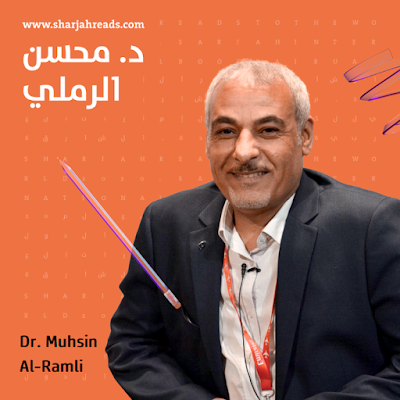
| Nov 16, 2020 |
“The outbreak of the coronavirus pandemic and the social isolation it has induced across societies is driving home the truth that amidst all the challenges impacting the world today, it is arts, culture and books that we can count on as our allies,” remarked Muhsin Al-Ramli, an Iraqi writer, poet, academic and translator, at a virtual cultural session held at the 39th Sharjah International Book Fair.
“So, read more books and find beauty in the world around you,” he urged the SIBF audience while speaking at a session discussing the ‘Influence of the Modern World on the Writing of Today’.
Al Ramli was joined by journalist and author Yasmin Alibhai-Brown on the ‘Sharjah Reads’ virtual platform and the session was moderated by Eman Al Yousef who raised the topic of a credibility crisis impacting both journalism and literature today.
“Before the advent of social media, we could rely on just a few newspapers for credible information. But today, there is so much disinformation as the sources of ‘news’ have increased, and we often do not know what the truth is,” said Al Ramli, whose novels Dates on My Fingers and The President’s Gardens were longlisted for the International Prize for Arabic Fiction. “I believe this is a great opportunity for powerful journalism to rise to the fore and re-establish its credentials as the real source of verified information.”
He added: “In journalism, credibility is judged based on the accuracy of reporting while in literature, the humanitarian ethos has been a constant and this lends it greater credibility.”
Alibhai-Brown, a print journalist for the past 35 years and who also has experience in both radio and television journalism, said: “Truth has become very slippery today. Social media is a root cause of distortions that we no longer know what is true or false. There are many who still believe the pandemic is a lie.”
“What I find troubling is the rise of ‘selfie media’ where young people go all out on virtual platforms with no understanding of what might happen,” added Alibhai-Brown, author of Ladies Who Punch. “The commercial exploitation of these young people who are turned into influencers on platforms that follow no rules or regulations is a disturbing development. Social media has given everyone a voice and extreme views are often amplified here.”
Muhsin Al-Ramli begged to differ. He said: “The positivity and negativity of social media stems from the way we use them. The discussions and sharing of ideas that once happened in physical cafes has now moved online. The strength of the individual comes from being part of the larger group, whether in a virtual or physical space.”
She added: “I have so much faith in the young people of today – they relate better to those who are different from them; they don’t see differences in the way their parents or grandparents did; so, I think after the hard times we are going through now, something new and civilised will come out of this.”
“Economics and politics are creating deep divides amongst societies; we need to revitalise efforts to boost power of arts and culture to instill love and acceptance of others,” Al-Ramli concluded.

https://nasher-news.com/muhsin-al-ramli-yasmin-alibhai-brown-social-media-lacks-credibility/
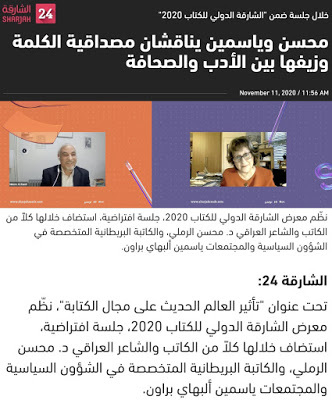
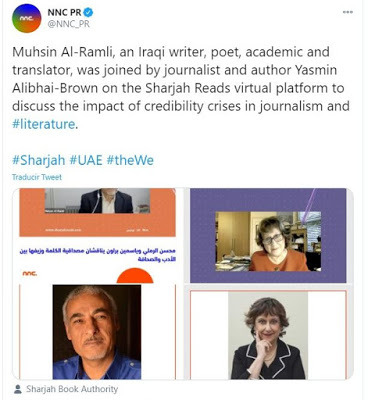
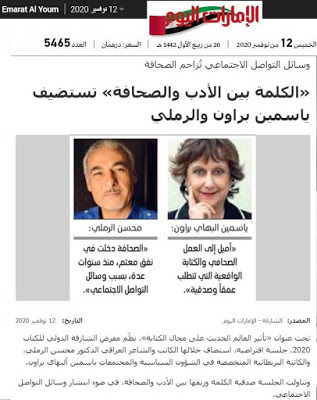
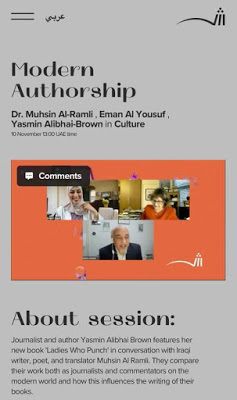
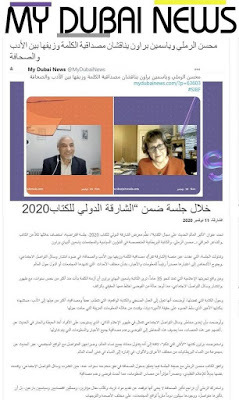
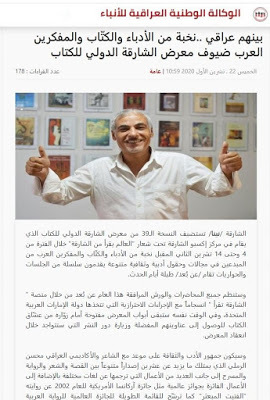
http://alramliarabic.blogspot.com/202...
September 11, 2020
The Exploration of Resistance in Al-Ramli's novels
The Exploration of Resistance in Al-Ramli's
Dates on my Fingers and Scattered Crumbs
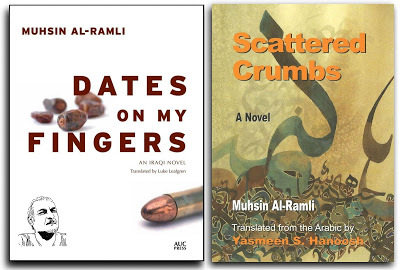
Saad Zaati Shamkhy, Lajiman Bin Janoory
https://ijels.com/upload_document/issue_files/27IJELS-107202042-TheExploration.pdf
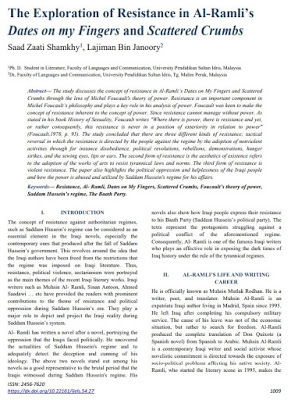
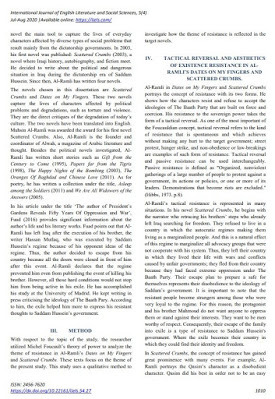
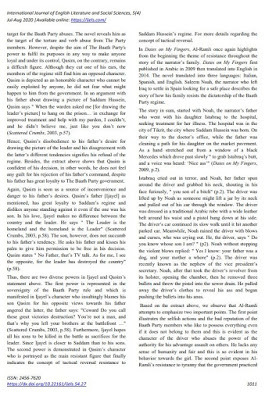
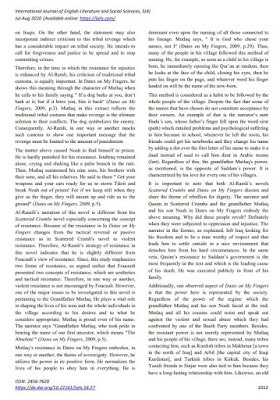
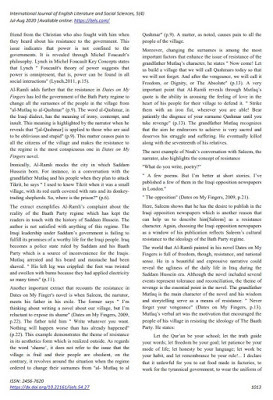
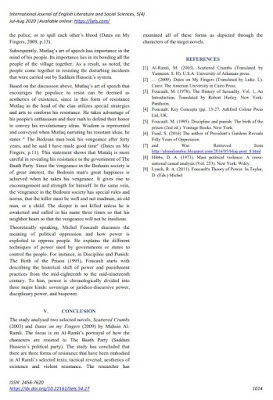
June 23, 2020
Los jardines del presidente, me acercó a los iraquíes / Rosa Luisa Guerra
Reseña“Los jardines del presidente” de Muhsin Al-Ramli,me acercó a los iraquíes
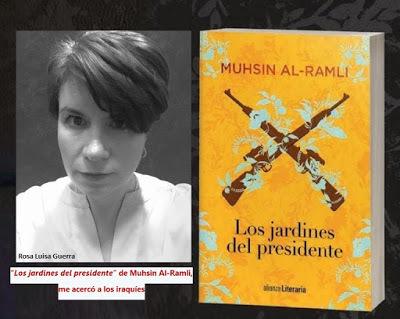
Rosa Luisa Guerra “Los jardines del presidente” de Muhsin Al-Ramli, autor nacido en 1967en Irak, país del que usualmente sólo sabemos que ahí estuvo Sadam Hussein.Pues justamente, por culpa de Sadam el autor vive en España desde 1995. Así que no es extraño que la sombra del dictador recorra este libro, sin ser nombrado, mientras conocemos la vida de tres amigos desde su infancia: Ibrahim, Tarek y Abdulá.Como es fácil adivinar, porque de iraquí no tengo ni un pelo y en la vida he ido, la obra me expuso a un mundo desconocido en muchos sentidos respecto a ciertas costumbres o modos de afrontar la vida, pero por otra, me acercó a los iraquíes de carne y hueso.A ellos que sólo he visto en las pantallas, sin voz, agrupados, movidos por otros, incluso, como enemigos porque la lejanía y el desconocimiento los hacen distantes y ajenos, de pronto los sentí cercanos en “Los jardines del presidente”.“Los jardines del presidente” me descubrió que son tan sensibles, tan amorosos, tan religiosos, tan descreídos, tan solidarios, tan enojones como cualquiera en cualquier parte. Sobre todo, tan vulnerables a las decisiones de otros, de los indiferentes gobernantes.Acompañé a los tres amigos que tienen diferentes antecedentes familiares, diferentes historias de amor, y diferentes formas de ganarse la vida a lo largo de varias décadas. Amistad que llega a trascender a las siguientes generaciones.El autor logró que sintiera la angustia y dolor que cada uno va enfrentando en distintos momentos mientras trataba de descubrir el misterio detrás de la muerte de uno de ellos. Misterio que es también el misterio mismo de Irak.La intriga por ir atando cabos hasta entender por qué el libro comienza donde comienza, me hacía devorar página tras página; pero a la vez, en ciertos pasajes me detenía como para contemplar el panorama. La elección del título cobró sentido en esa contemplación.El autor, además, me parece que tiene la maestría de contener sus propios sentimientos, los que los acontecimientos en su patria le deben haber suscitado y me dejó vivirlos a través de los ojos de sus personajes.Las razones para leerla son muchas: conocer más de una nación tan lejana, quedar atrapado en una narrativa que fluye entre lo cotidiano y lo extraordinario, entre lo terrenal y lo espiritual, compartir los lazos de amistad inquebrantable.Si eres de los que les interesa los premios para animarte, “Los jardines del presidente” fue publicada en árabe en 2012 y has sido reconocida internacionalmente desde entonces: fue finalista del IPAF, un premio para libros en árabe y ganó el English Pen Award.Ya lo saben aquí hay una opción de lectura: Muhsin Al-Ramli “Los jardines del presidente” de Alianza Literaria.https://www.alianzaeditorial.es/libro/alianza-literaria-al/los-jardines-del-presidente-muhsin-al-ramli-9788491812760/
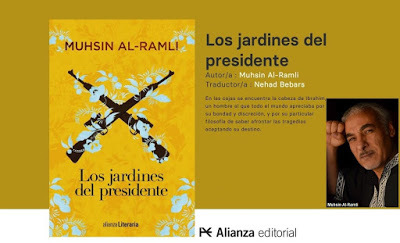
https://twitter.com/YoLaMerita/status/1235387742604996608
August 26, 2019
La maté porque la amaba/ Muhsin Al-Ramli
CuentoLa maté porque la amaba
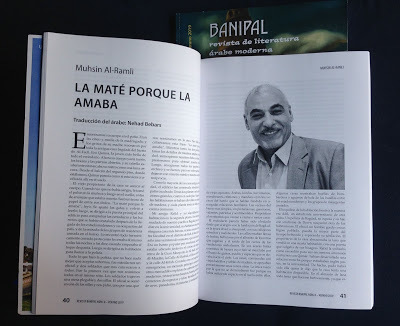 Muhsin Al-RamliTraducción de: Nehad BebarsEncontramos su cuerpo en el patio. Eran las cinco y media de la madrugada, y los gritos de su madre resonaron por toda la antigua casa bagdadí del barrio de Al-Fadl. Era Qamar, la joven más bella de todo el vecindario. Ahora su cuerpo yacía inerte, los brazos y las piernas abiertos, y su cabello exuberante enmarcaba su rostro como una luna oscura. Desde el balcón del segundo piso, donde estábamos, Qamar parecía como si estuviera crucificada allí en el suelo...........................................https://revistabanipal.com/?p=365
Muhsin Al-RamliTraducción de: Nehad BebarsEncontramos su cuerpo en el patio. Eran las cinco y media de la madrugada, y los gritos de su madre resonaron por toda la antigua casa bagdadí del barrio de Al-Fadl. Era Qamar, la joven más bella de todo el vecindario. Ahora su cuerpo yacía inerte, los brazos y las piernas abiertos, y su cabello exuberante enmarcaba su rostro como una luna oscura. Desde el balcón del segundo piso, donde estábamos, Qamar parecía como si estuviera crucificada allí en el suelo...........................................https://revistabanipal.com/?p=365
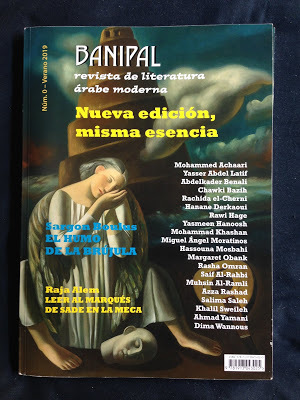
July 16, 2019
Os Jardins do Presidente – Muhsin Al-Ramli - Iraq
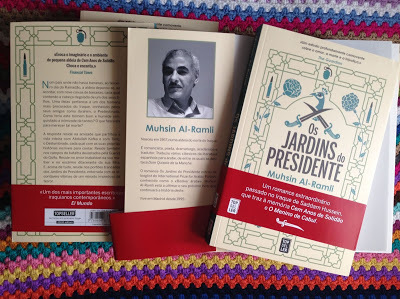 «Uma referência na literatura contemporânea do Médio Oriente.»
- Booklist
Num país onde não havia bananas, ao terceiro dia do Ramadão, a aldeia deparou-se, ao acordar, com nove caixas de bananas, cada qual contendo a cabeça degolada de um dos seus filhos. Uma delas pertencia a um dos homens mais procurados do Iraque, conhecido pelos seus amigos como Ibrahim, o Predestinado.Como teria este homem bom e humilde conquistado a inimizade de tantos? O que fizera ele para merecer tal morte? A resposta reside na amizade que partilhou a vida inteira com Abdullah Kafka e com Tariq, o Deslumbrado, cada qual com as suas próprias histórias incríveis para contar. Reside também nos campos de batalha devastados pela Guerra do Golfo. Reside no amor inabalável da sua mulher e no escárnio dilacerante da sua filha.E, acima de tudo, reside nos portões trancados dos Jardins do Presidente, enterrada com as incontáveis vítimas de um reinado impiedoso de terror.Um romance extraordinário passado no Iraque de Saddam Hussein, que traz à memória Cem Anos de Solidão e O Menino de Cabul.
«Uma referência na literatura contemporânea do Médio Oriente.»
- Booklist
Num país onde não havia bananas, ao terceiro dia do Ramadão, a aldeia deparou-se, ao acordar, com nove caixas de bananas, cada qual contendo a cabeça degolada de um dos seus filhos. Uma delas pertencia a um dos homens mais procurados do Iraque, conhecido pelos seus amigos como Ibrahim, o Predestinado.Como teria este homem bom e humilde conquistado a inimizade de tantos? O que fizera ele para merecer tal morte? A resposta reside na amizade que partilhou a vida inteira com Abdullah Kafka e com Tariq, o Deslumbrado, cada qual com as suas próprias histórias incríveis para contar. Reside também nos campos de batalha devastados pela Guerra do Golfo. Reside no amor inabalável da sua mulher e no escárnio dilacerante da sua filha.E, acima de tudo, reside nos portões trancados dos Jardins do Presidente, enterrada com as incontáveis vítimas de um reinado impiedoso de terror.Um romance extraordinário passado no Iraque de Saddam Hussein, que traz à memória Cem Anos de Solidão e O Menino de Cabul.
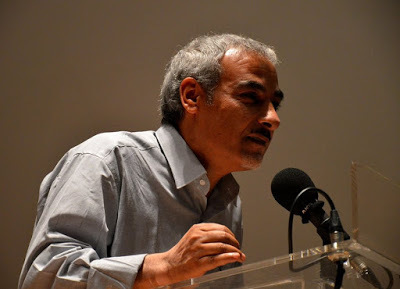
Muhsin Al-Ramli nasceu em 1967, numa aldeia do norte do Iraque. É romancista, poeta, dramaturgo, académico e tradutor. Traduziu vários clássicos da literatura espanhola para árabe, de entre os quais se destaca Don Quixote de la Mancha.O romance Os Jardins do Presidente entrou na longlist do International Prize for Arabic Fiction, conhecido como o «Booker árabe». Vive em Madrid desde 1995.https://www.topseller.pt/livros/os-jardins-do-presidente
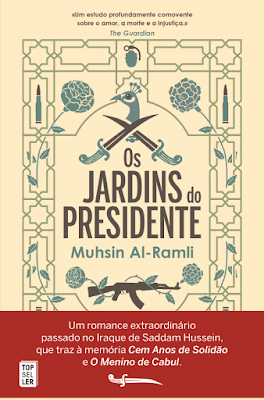 AUTOR Muhsin Al-RamliILUSTRADORCOLEÇÃO Muhsin Al-RamliISBN 9789898873958PVP 17,69 € (IVA incluído)preço fixo até fim de dezembro de 20201ª EDIÇÃO junho de 2019EDIÇÃO ATUAL 1.ªPÁGINAS 320APRESENTAÇÃO capa moleDIMENSÕES 150x230x18,5 mm
AUTOR Muhsin Al-RamliILUSTRADORCOLEÇÃO Muhsin Al-RamliISBN 9789898873958PVP 17,69 € (IVA incluído)preço fixo até fim de dezembro de 20201ª EDIÇÃO junho de 2019EDIÇÃO ATUAL 1.ªPÁGINAS 320APRESENTAÇÃO capa moleDIMENSÕES 150x230x18,5 mm
May 25, 2019
Unos jardines de Irak / Lorena Iglesias
Unos jardines de un país llamado Irak
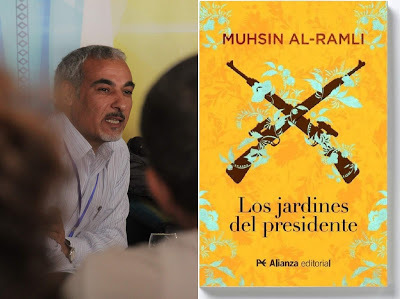
Lorena Iglesias Fernández Los jardines del presidente es la última novela de Muhsin Al-Ramli, es la primera que yo leo de este escritor y, pronostico, que no será la última.La novela empieza en un pequeño pueblo rural de Irak tras la invasión de la coalición estadounidense. Un pueblo tranquilo, en el que las guerras, porque han sufrido más de una y dos en las últimas décadas, se habían notado sólo en sus habitantes que entraban amanece con el descubrimiento de nueve cabezas en cajas para transportar plátanos.Entre las cabezas está la de Ibrahim, uno de “los hijos de la grieta”. Éstos son los protagonistas de la historia, tres amigos que sufren la guerra, el cautiverio, la postguerra y las consecuencias de vivir en las proximidades de un tirano. Sus vidas simbolizan el sufrimiento de un país y el sufrimiento de un Pueblo por culpa de tiranos y guerras.Pese a que “los hijos de la grieta” son los protagonistas y sus vivencias y desgracias son el hilo conductor de esta novela cruda y salvaje de la época en la que Saddam Hussein, aunque nunca se le nombre, gobernaba el país, yo me voy a detener en las mujeres que orbitan alrededor de estos personajes, porque el sufrimiento de estas mujeres, ficticias, es el reflejo de lo que muchas otras, reales, sufren a diario en muchos países y que muchas veces son olvidadas.Samiha, obligada a casarse con uno de sus primos, en vez de con la persona que ama, cada vez que huye de su marido es golpeada y obligada a volver, hasta que es repudiada por su marido.Quisma, una mujer joven con altas aspiraciones en la vida. Se casa con un oficial del Ejército, es violada por un hombre, que no voy a desvelar, y tras la invasión su marido desaparece. Se queda viuda, con un hijo, y con la “necesidad” de casarse para evitar algunas suspicacias de la sociedad.Zakia, otra mujer joven, pero esta con una discapacidad intelectual. Un hombre joven, casi de la familia, se aprovecha de su discapacidad para tener relaciones sexuales con ella. Se queda embaraza, la encierran hasta que da a luz y tras eso, la lapidan y la entierra. Los hombres que le hacen todas estas cosas viven su vida después como si nada.Zeineb, una anciana que, por las convenciones sociales, aguantó una vida de horrores, que la mantuvo en vilo durante toda su vida.Estas son sólo cuatro de las mujeres que aparecen en la novela, son cuatro historias de injusticias que miles de mujeres en Irak y en otros muchos países viven a diario. Son cuatro historias que tienen un apartado reducido dentro de la historia mayor, pero que sin las cuales la historia no se desarrollaría tal y como lo hace.https://plumilladecidiovolar.wordpress.com/2019/04/01/unos-jardines-de-un-pais-llamado-irak/
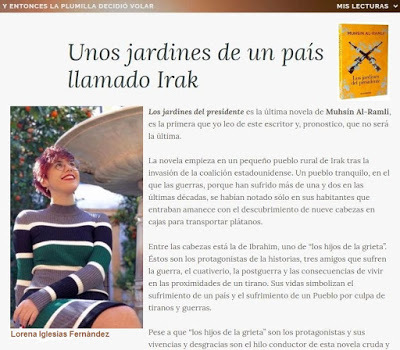
May 23, 2019
Interview/ Iraqi poet Muhsin Al-Ramli
An Iraqi poet’s view of the merits of literature“It’s time for other people from other cultures to read us and know us better through our literature.” - Iraqi poet Muhsin Al-Ramli
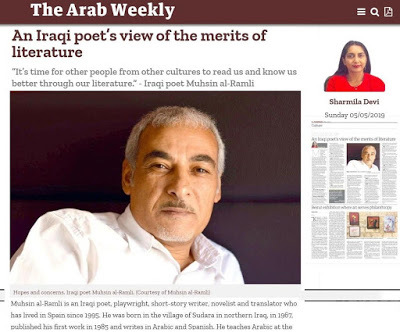 https://thearabweekly.com/iraqi-poets-view-merits-literatureBy: Sharmila DeviThe Arab WeeklyMuhsin Al-Ramli is an Iraqi poet, playwright, short-story writer, novelist and translator who has lived in Spain since 1995. He was born in the village of Sudara in northern Iraq, in 1967, published his first work in 1985 and writes in Arabic and Spanish. He teaches Arabic at the Saint Louis University in Madrid.He fled Iraq after the death of his brother, poet Hassan Mutlak, who was hanged in 1990 after six months of imprisonment during which he was tortured for his involvement in an attempted coup against Iraqi President Saddam Hussein.In 2006, nine of Ramli’s relatives were killed in Iraq and their severed heads were found in banana crates. He uses the incident in the opening of his novel “The President’s Gardens,” which recounts the effects of Iraq’s wars on ordinary people over the past 50 years and which was recently translated into English to glowing reviews. He spoke with The Arab Weekly via e-mail.The Arab Weekly (TAW): You wrote your novel “The President’s Gardens” partly as a response to the killing of nine of your relatives. Have you achieved any peace, if that is possible?Muhsin Al-Ramli (MAR): “Yes, up to a point. I feel relieved because to express something helps the one who says it and the one who hears it. A human being has to express himself and everything he does in life is a form of expression.“As for the book, I’ve received thousands of messages of thanks from relatives of victims in Iraq and that makes me feel that I’ve helped the many who are suffering to raise their voices further, something that allows them to be supported and heard.”TAW: Is the killing of your brother still part of your motivation to write and in what way? How do you think he might have reacted to your work?MAR: “I wish my brother were still alive and could read this and my other books, which I wrote to please him. Part of my task is to continue writing so that his name survives as long as I’m alive.“He was my master and my idol. He confronted the [Saddam] dictatorship directly and lost his life when the dictator was at the height of his power, control and savagery.“Many national Arabs see this dictator as a hero, a leader and a source of pride and I want to tell them who he was in reality, this tyrant, the murderer of my brother and my people, through a literary description of the disaster and destruction that he brought to Iraq and above all the great harm and pain he caused to families, lives and the souls of people.”TAW: Do you feel the translation into English, Spanish and other languages of your novels and those of other contemporary Arabic writers is helping to bridge Western ignorance of the Middle East and in what way?MAR: “Yes but very little up to now because this vacuum is too deep. There’s a general ignorance in the West about Arab culture, literature, people’s complex situation, history and modern reality.“The press, which both manipulates and is manipulated, is not enough, nor is it the best medium for knowledge. For example, the press talks of victims in terms of numbers, while literature focuses on the human and on every victim, his circumstances, his thoughts, feelings and dreams.“We have got to know other cultures better, among them the West and Latin America, more through literature than the press. It’s time for other people from other cultures to read us and know us better through our literature.”TAW: Have you noticed any change in attitudes among your students towards the Middle East since you started to teach Arabic language, literature and culture?MAR: “Without a doubt, many came to my classes out of curiosity and took them as a secondary option but they’ve ended up wanting to specialise in it for the rest of their lives. Others are living in Arab countries or have married Arabs.“In general, people fear the unknown and tend to judge it badly or superficially but when they open themselves up and get closer, they get to know it better and, in some cases, fall in love with it. Knowledge is the key to everything.”TAW: Your last trip to Iraq was in 2014. Are you planning any trips back? How do you feel about Iraq now? Do you feel optimistic about its future?MAR: “I want to and must visit Iraq when I can, especially now that my people have been liberated from [the Islamic State] ISIS after four hard and savage years.“I want to see my sisters and nephews, who were miraculously spared.“As for the future of Iraq, it will continue to be difficult, complicated and hard. No one could yet say that Iraq is in the hands of Iraqis. It’s not a truly sovereign country and its running is in the hands of others, such as Iran, the US and other foreigners.”TAW: Do you think that Arabic language literary prizes are helping to encourage more Arabs to read fiction?MAR: “Yes, to a great extent, although these prizes often hurt the quality of the literature when they encourage writers and those who are not writers to produce too much too quickly in order to participate. They also sometimes give the prize to mediocre works for reasons that have nothing to do with quality.“But the marvellous phenomenon these days of being able to read many novels in the Arab world is not thanks to prizes but because the young, who are a majority of the Arab population, are looking for a vision of the world, a form of understanding it and themselves and their identity, especially without the weight of ideology, philosophy and loss of faith in books of religion, politics, official education and even history books that contain so much manipulation.”
https://thearabweekly.com/iraqi-poets-view-merits-literatureBy: Sharmila DeviThe Arab WeeklyMuhsin Al-Ramli is an Iraqi poet, playwright, short-story writer, novelist and translator who has lived in Spain since 1995. He was born in the village of Sudara in northern Iraq, in 1967, published his first work in 1985 and writes in Arabic and Spanish. He teaches Arabic at the Saint Louis University in Madrid.He fled Iraq after the death of his brother, poet Hassan Mutlak, who was hanged in 1990 after six months of imprisonment during which he was tortured for his involvement in an attempted coup against Iraqi President Saddam Hussein.In 2006, nine of Ramli’s relatives were killed in Iraq and their severed heads were found in banana crates. He uses the incident in the opening of his novel “The President’s Gardens,” which recounts the effects of Iraq’s wars on ordinary people over the past 50 years and which was recently translated into English to glowing reviews. He spoke with The Arab Weekly via e-mail.The Arab Weekly (TAW): You wrote your novel “The President’s Gardens” partly as a response to the killing of nine of your relatives. Have you achieved any peace, if that is possible?Muhsin Al-Ramli (MAR): “Yes, up to a point. I feel relieved because to express something helps the one who says it and the one who hears it. A human being has to express himself and everything he does in life is a form of expression.“As for the book, I’ve received thousands of messages of thanks from relatives of victims in Iraq and that makes me feel that I’ve helped the many who are suffering to raise their voices further, something that allows them to be supported and heard.”TAW: Is the killing of your brother still part of your motivation to write and in what way? How do you think he might have reacted to your work?MAR: “I wish my brother were still alive and could read this and my other books, which I wrote to please him. Part of my task is to continue writing so that his name survives as long as I’m alive.“He was my master and my idol. He confronted the [Saddam] dictatorship directly and lost his life when the dictator was at the height of his power, control and savagery.“Many national Arabs see this dictator as a hero, a leader and a source of pride and I want to tell them who he was in reality, this tyrant, the murderer of my brother and my people, through a literary description of the disaster and destruction that he brought to Iraq and above all the great harm and pain he caused to families, lives and the souls of people.”TAW: Do you feel the translation into English, Spanish and other languages of your novels and those of other contemporary Arabic writers is helping to bridge Western ignorance of the Middle East and in what way?MAR: “Yes but very little up to now because this vacuum is too deep. There’s a general ignorance in the West about Arab culture, literature, people’s complex situation, history and modern reality.“The press, which both manipulates and is manipulated, is not enough, nor is it the best medium for knowledge. For example, the press talks of victims in terms of numbers, while literature focuses on the human and on every victim, his circumstances, his thoughts, feelings and dreams.“We have got to know other cultures better, among them the West and Latin America, more through literature than the press. It’s time for other people from other cultures to read us and know us better through our literature.”TAW: Have you noticed any change in attitudes among your students towards the Middle East since you started to teach Arabic language, literature and culture?MAR: “Without a doubt, many came to my classes out of curiosity and took them as a secondary option but they’ve ended up wanting to specialise in it for the rest of their lives. Others are living in Arab countries or have married Arabs.“In general, people fear the unknown and tend to judge it badly or superficially but when they open themselves up and get closer, they get to know it better and, in some cases, fall in love with it. Knowledge is the key to everything.”TAW: Your last trip to Iraq was in 2014. Are you planning any trips back? How do you feel about Iraq now? Do you feel optimistic about its future?MAR: “I want to and must visit Iraq when I can, especially now that my people have been liberated from [the Islamic State] ISIS after four hard and savage years.“I want to see my sisters and nephews, who were miraculously spared.“As for the future of Iraq, it will continue to be difficult, complicated and hard. No one could yet say that Iraq is in the hands of Iraqis. It’s not a truly sovereign country and its running is in the hands of others, such as Iran, the US and other foreigners.”TAW: Do you think that Arabic language literary prizes are helping to encourage more Arabs to read fiction?MAR: “Yes, to a great extent, although these prizes often hurt the quality of the literature when they encourage writers and those who are not writers to produce too much too quickly in order to participate. They also sometimes give the prize to mediocre works for reasons that have nothing to do with quality.“But the marvellous phenomenon these days of being able to read many novels in the Arab world is not thanks to prizes but because the young, who are a majority of the Arab population, are looking for a vision of the world, a form of understanding it and themselves and their identity, especially without the weight of ideology, philosophy and loss of faith in books of religion, politics, official education and even history books that contain so much manipulation.”
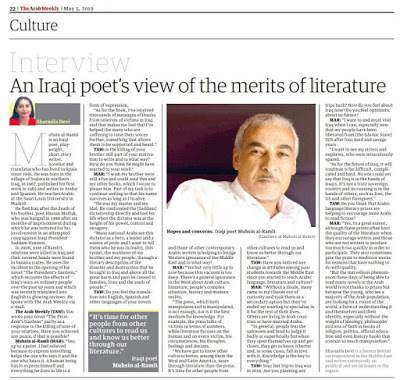 https://thearabweekly.com/iraqi-poets-view-merits-literatureWritten By
Sharmila Devi
Sharmila Devi is a former British correspondent in the Middle East and writes extensSharmila Devi is a former British correspondent in the Middle East and writes extensively on political and social issues in the region.
https://thearabweekly.com/iraqi-poets-view-merits-literatureWritten By
Sharmila Devi
Sharmila Devi is a former British correspondent in the Middle East and writes extensSharmila Devi is a former British correspondent in the Middle East and writes extensively on political and social issues in the region.
The President's Gardens | Free Audiobook
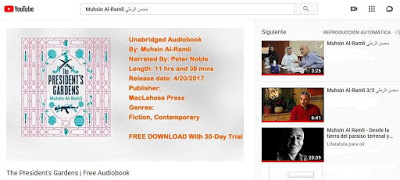 https://www.youtube.com/watch?v=yWwdyI-6g0w
The Presidents Gardens
Audiobookhttps://www.audible.com/pd/The-Presidents-Gardens-Audiobook/B06XH1NF65
https://www.youtube.com/watch?v=yWwdyI-6g0w
The Presidents Gardens
Audiobookhttps://www.audible.com/pd/The-Presidents-Gardens-Audiobook/B06XH1NF65

The President's Gardens/The Saif Ghobash Banipal Prize
The Saif Ghobash Banipal Prize for Arabic Literary Translation
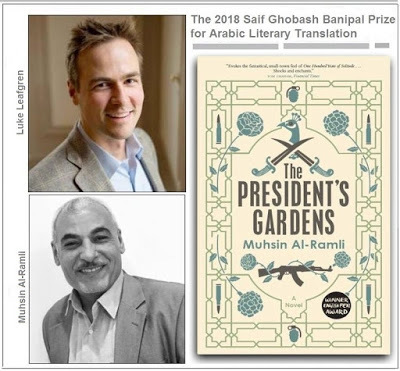 http://www.banipaltrust.org.uk/prize/award2018.cfm
http://www.banipaltrust.org.uk/prize/award2018.cfm LUKE LEAFGREN
LUKE LEAFGRENwins the 2018 Prize
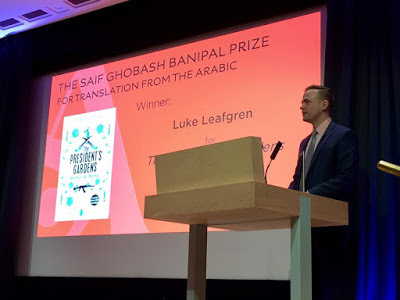
"A seamless rendering ofan outstanding work of fiction"The 2018 Saif Ghobash Banipal Prize for Arabic Literary Translation is awarded to Luke Leafgren for his translation of the novel The President's Gardens by Iraqi author Muhsin Al-Ramli, published by MacLehose Press. The judges chose his translation from the shortlist of four works announced on 10 December 2018. The award of £3,000 will be presented to Luke Leafgren on 13 February 2019 at the Translation Prizes Award Ceremony, organised and hosted by the Society of Authors, at the British Library's Knowledge Centre, along with the other translation prizes being awarded this year. The judging panel comprised publisher and translator Pete Ayrton (chair), editor and translator Georgia de Chamberet, Jordanian author Fadia Faqir, and university lecturer and translator Sophia Vasalou. The prize is administered by Paula Johnson, Head of Prizes and Awards at the Society of Authors.
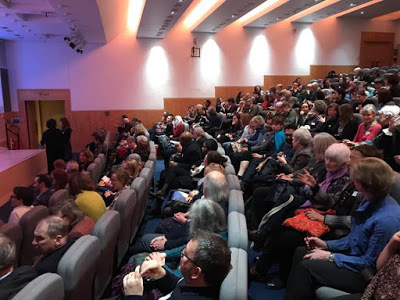 THE JUDGES' REPORTTHE WINNER
THE JUDGES' REPORTTHE WINNERLuke Leafgren for his translation of the novel The President's Gardens by Muhsin Al-Ramli
In this brilliant novel the personal, political and fantastical are interwoven to excavate and record Iraq's recent history in all its complexity, horror and absurdity. The translation by Luke Leafgren is imperceptible and mirrors the writer's many changes of register. The author is fortunate to have found a translator totally in sympathy with his writing. Faced with many difficult choices, Leafgren has produced a work both faithful to the Arabic and a work of art in English.In a clear reference to Gabriel Garcia Márquez's Macondo, which was destroyed by the establishment of a banana plantation, Muhsin Al-Ramli's begins his novel with the discovery of nine banana crates, each containing a severed, mutilated head in an Iraqi village without bananas – one of the heads belonged to Ibrahim, "the fated", who is made sterile by poison gas in the Iran war, loses his foot during the invasion of Kuwait and, then, finds a job in the President's Gardens.When Ibrahim is appointed to "care for these roses", he is impressed with how immaculate the garden appears on the surface - the crimes lie beneath. His job description and responsibilities keep shifting as he descends into the inferno until he becomes a grave-digger.Despite Ibrahim's fear and fatalism, he begins to give the dead a dignified burial, register the date and time of their killing, establish and document their identity by painstakingly gathering shreds of evidence like skin, teeth, nails, etc.Ibrahim's acts of salvation give a history to the thousands of Iraqi disappeared. The point is made that ordinary people can make a difference – giving an identity to nameless corpses ensures that they cannot be forgotten.Tender, funny, tragic, wise and poetic, The President's Garden is imbued with the richness and complexity of a region that has known little peace over the last century. Luke Leafgren's translation conveys beautifully the spirit and idiosyncrasies of the original. It is a seamless rendering of an outstanding work of fiction. Both author and translator are to be warmly congratulated.
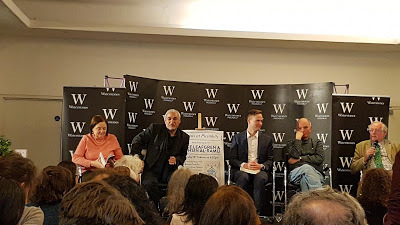 * * *Winner Luke Leafgren says:
* * *Winner Luke Leafgren says:"Learning that my translation was selected for the shortlist was already the recognition that pleased me more than any other in my life, and I've been enjoying a complicated feeling of being grateful, humbled, proud, and inspired ever since. I am so grateful to Muhsin for writing this novel and then entrusting me with its translation. I think of Khaled Al-Masri, my good friend and Arabic teacher who helped me get my start in translating. I also feel my debt of gratitude to Yousif Hanna, an Iraqi friend who read parts of The President's Gardenswith me to answer all my linguistic and cultural questions, and who could become a preeminent literary scholar if he weren't committed to a career in medicine. Finally, to Paul Engles and Christopher MacLehose, for believing in this book and publishing the translation."
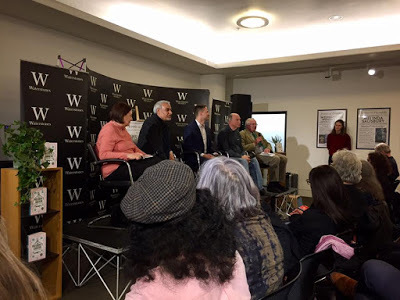
Publisher Christopher MacLehose says:
"This is wonderful news. It gives a publisher immense pride that the scholarship and the genius of our translator should be recognised by the jury for your award."
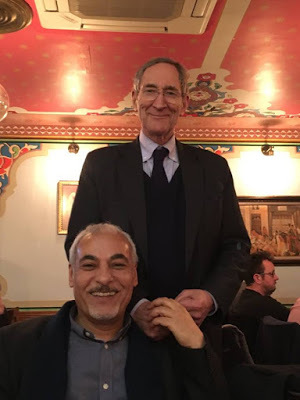
ABOUT THE WINNING TRANSLATORLuke Leafgren is an Assistant Dean of Harvard College and teaches Arabic at Harvard University, where he received his PhD in Comparative Literature in 2012. He is also a keen sailor, and the inventor of the StandStand portable standing desk.As well as translating the winning novel The President's Gardens, his first venture into literary translation was Mushin Al-Ramli's second novel Dates on my Fingers (2014). He has also translated the debut novel of Shahad Al Rawi The Baghdad Clock (2018), whose Arabic original was shortlisted for the 2018 International Prize for Arabic Fiction, and Oh Salaam!(2014) by Najwa Barakat.On the MacLehose Press website he describes how he came to translate The President's Gardens."Muhsin Al-Ramli was the first author I ever translated. While writing my dissertation and needing a creative outlet, I approached one of my Arabic teachers during the final years of graduate school to ask about how to get a start in literary translation. My teacher told me about a friend of his who was looking for a translator for his second novel. That friend was Muhsin, who passed through my teacher's hometown of Irbid, Jordan, on his way from Iraq to Spain in the early '90s. I read the novel – Dates on My Fingers – and as I was reading the Arabic text, I could hear in my head the voice of the narrator telling his story in English. I found myself relating to the narrator's attempt to make sense of his place in the world, and the English translation came through almost as quickly as I read." To continue, go to this link: https://www.maclehosepress.com/blog/2018/4/5/luke-leafgren-on-translating-the-presidents-gardens
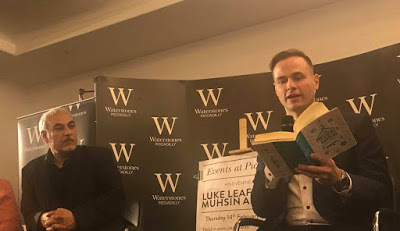
ABOUT THE AUTHORMuhsin Al-Ramli was born in the village of Sudara, northern Iraq, in 1967. Since 1995 he has lived in Madrid, Spain, where he has published 11 works – collections of short stories, novels, a play, essays and poetry, in addition to translating some Spanish classics into Arabic, most notably Don Quixote, and co-founding Alwaha literary magazine. He has a PhD in Philosophy and Spanish Literature from the Autonomous University of Madrid (2003), and teaches at the Saint Louis University, Madrid.His three novels to date are all translated into English: the first, Scattered Crumbs,translated by Yasmeen Hanoosh, won the Arkansas Manuscript Translation Award; the second, Dates on My Fingers, and third, The President's Gardens, were both translated by Luke Leafgren, with both their Arabic originals being longlisted for the International Prize for Arabic Fiction (IPAF, aka Arabic Booker Prize) in 2009 and 2013 respectively. His novel-in-progress, Qisma's Fate, a follow-up to The President's Gardens, and also being translated by Luke Leafgren, is due out later this year.Muhsin Al-Ramli writes on the MacLehose Press website about how he came to start writing the book in 2006. "I began writing The President's Gardens in 2006 after receiving the news of the murder of nine of my relatives, who were fasting on the third day of Ramadan. The people of the village found only their heads in banana crates, along with their identity cards. I dedicated the novel to their souls. It was a huge shock to me. It horrified me, and, to start with, the novel was a reaction to this event undertaken without planning or a clear vision."To continue, go to this link: https://www.maclehosepress.com/blog/2018/4/5/muhsin-Al-Ramli-why-i-wrote-the-presidents-gardens
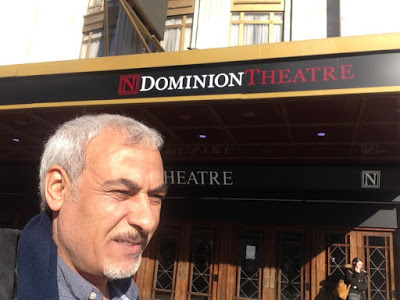
ABOUT THE WINNING TRANSLATION The President's Gardens
MacLehose Press (20 April 2017),Paperback edition: 352 pagesISBN 9780857056788
The translated novel The President's Gardens has already been much reviewed and talked about since publication in 2017. Its Arabic original sold well and was longlisted for the International Prize for Arabic Fiction in 2013. It also has a Spanish edition Los Jardines Del Presidente.
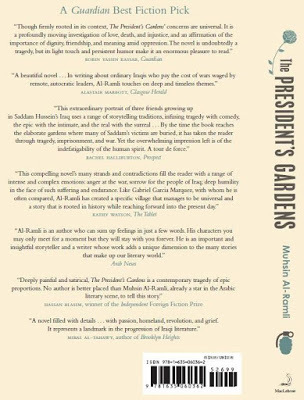 Buy a copy in UK
Buy a copy in UKhttps://www.amazon.co.uk/Presidents-Gardens-Muhsin-Al-Ramli/dp/0857056786Buy a copy in US
https://www.amazon.com/Presidents-Gardens-MacLehose-Press-Editions-ebook/dp/B01GVOH04W
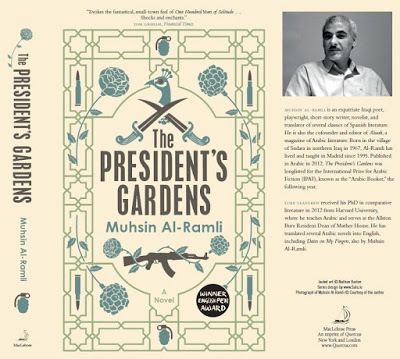
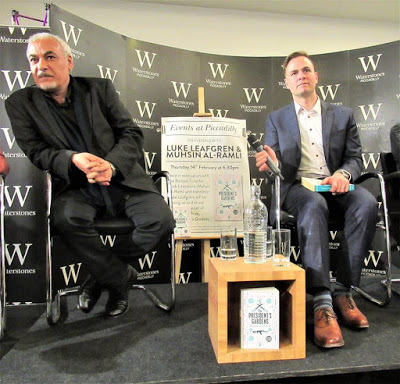
EVENTS:• TRANSLATION PRIZES AWARD CEREMONY
7.00pm Wednesday 13 FebruaryThe Knowledge Centre, The British Library, 96 Euston Rd, London NW1 2DB
Hosted and organised by the Society of Authors, who administer all the prizes, the ceremony will award prizes for translation from Arabic, French, Italian German and Spanish and the Translators' Association First Translation Prize. https://www.societyofauthors.org/Prizes/Translation-Prizes
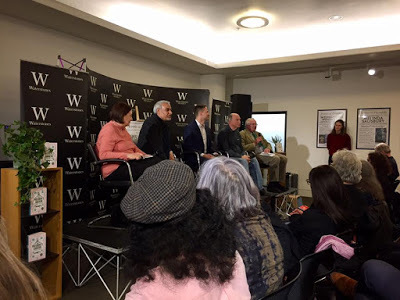
• AN EVENING WITH LUKE LEAFGREN AND MUHSIN AL-RAMLIDiscussions, Readings and Q&A ............... and refreshments6.30pm Thursday 14 February, Lower Ground Reception, Waterstones Piccadilly, London W1V 9LW
Hosted by Banipal Trust for Arab Literature. prize/award2018.cfm This is a free event, but places must be booked to avoid disappointment. Please register here on the Waterstones Piccadilly Events special webpage.
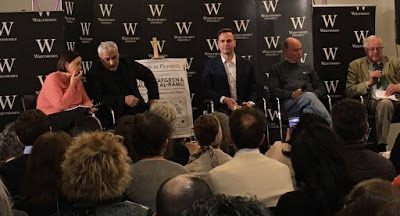
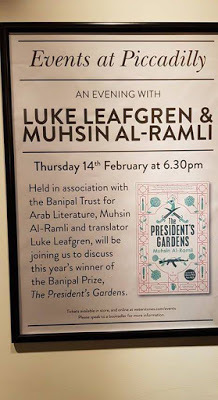
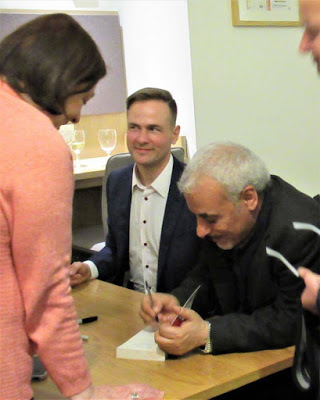
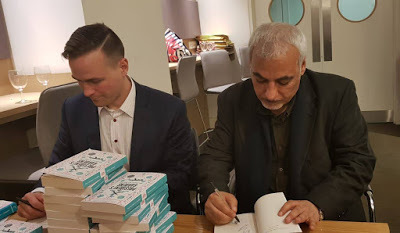
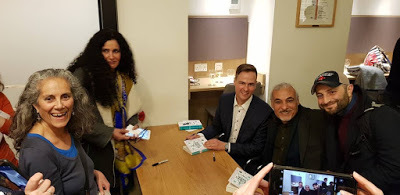
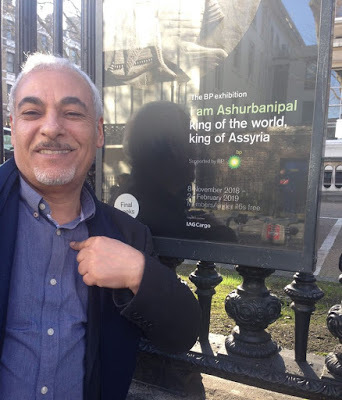
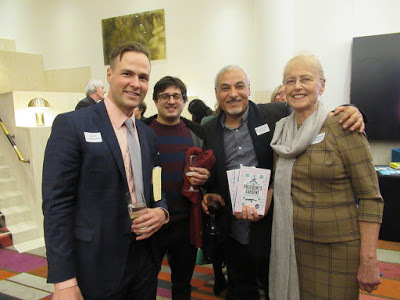 * * *The 2018 Prize – The ShortlistThe Saif Ghobash Banipal Prize is delighted to announce the shortlist of the 2018 Prize. The four works are translated by two former winners of the prize, Khaled Mattawa and Jonathan Wright, and two relative newcomers to literary translation Ben Koerber and Luke Leafgren.The judges were impressed by the tremendous variety of the entries from different parts of the Arab world, ranging through poetry, crime, literary fiction and graphic novels. The shortlist reflects this diversity, with two novels about the wars in Iraq and their aftermath, a collection of poetry about Jerusalem, and a contemporary take on Cairo today. In the face of social and political upheaval, literature continues to make waves in the Arab world.Using Life by Ahmed Naji (Egypt),
* * *The 2018 Prize – The ShortlistThe Saif Ghobash Banipal Prize is delighted to announce the shortlist of the 2018 Prize. The four works are translated by two former winners of the prize, Khaled Mattawa and Jonathan Wright, and two relative newcomers to literary translation Ben Koerber and Luke Leafgren.The judges were impressed by the tremendous variety of the entries from different parts of the Arab world, ranging through poetry, crime, literary fiction and graphic novels. The shortlist reflects this diversity, with two novels about the wars in Iraq and their aftermath, a collection of poetry about Jerusalem, and a contemporary take on Cairo today. In the face of social and political upheaval, literature continues to make waves in the Arab world.Using Life by Ahmed Naji (Egypt), translated by Ben Koerber (CMES Publications, University of Texas at Austin)The President's Gardens by Muhsin Al-Ramli (Iraq),
translated by Luke Leafgren (MacLehose Press)Concerto al-Quds by Adonis (Syria),
translated by Khaled Mattawa (Yale University Press)Frankenstein in Baghdad by Ahmed Saadawi (Iraq),
translated by Jonathan Wright (Oneworld)
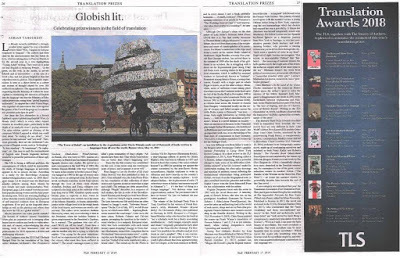
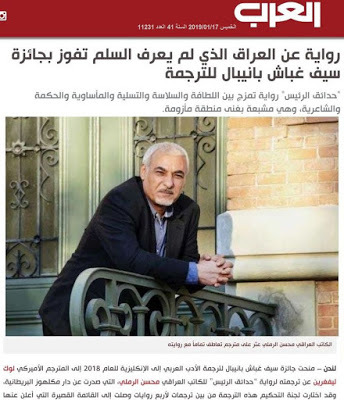
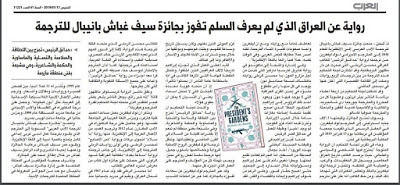
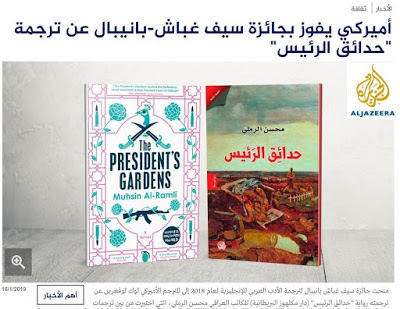
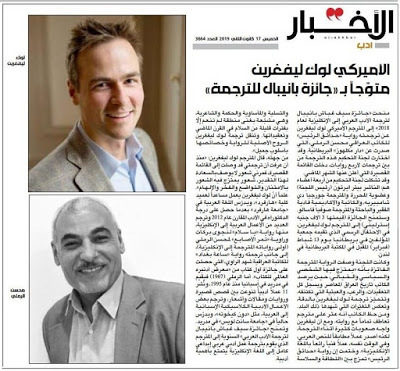
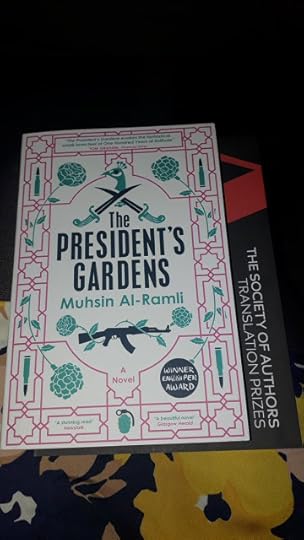
May 6, 2019
Muhsin Al Ramli – relatos - Literatura para oír
Muhsin Al RamliDesde la tierra del paraíso terrenal y relatosLi teratura para oír
Del escritor iraquí Muhsin Al-Ramli,Desde la tierra del paraíso terrenal y otros relatos.
https://www.youtube.com/watch?v=oWl5OEQeYrM
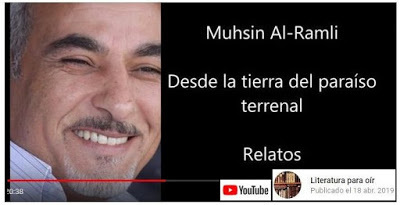
Muhsin Al-Ramli's Blog
- Muhsin Al-Ramli's profile
- 82 followers



